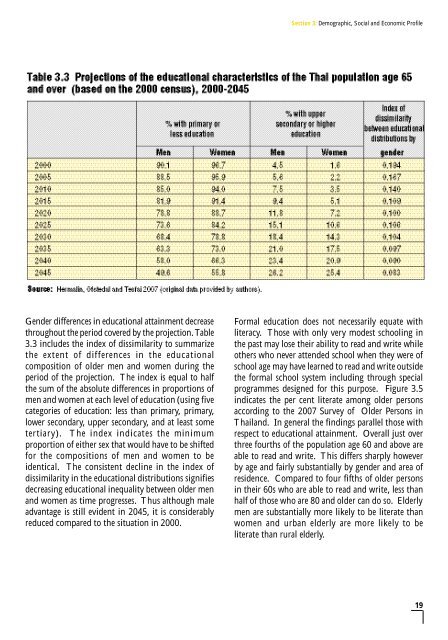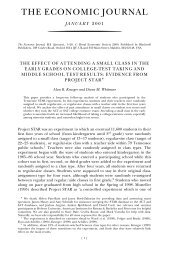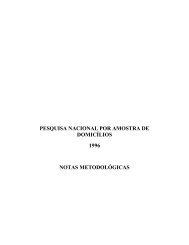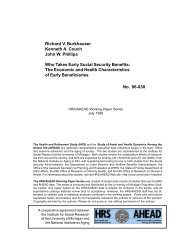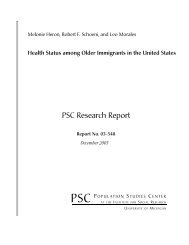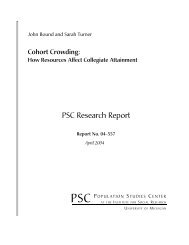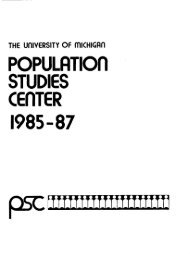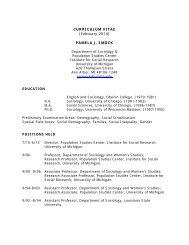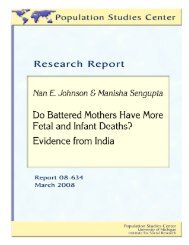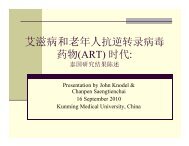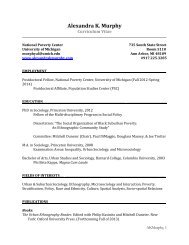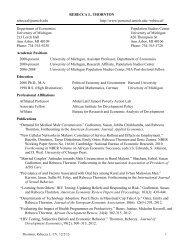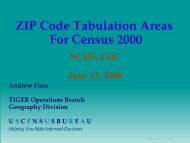Population Ageing and the Well-Being of Older Persons in Thailand ...
Population Ageing and the Well-Being of Older Persons in Thailand ...
Population Ageing and the Well-Being of Older Persons in Thailand ...
Create successful ePaper yourself
Turn your PDF publications into a flip-book with our unique Google optimized e-Paper software.
Section 3: Demographic, Social <strong>and</strong> Economic Pr<strong>of</strong>ile<br />
Gender differences <strong>in</strong> educational atta<strong>in</strong>ment decrease<br />
throughout <strong>the</strong> period covered by <strong>the</strong> projection. Table<br />
3.3 <strong>in</strong>cludes <strong>the</strong> <strong>in</strong>dex <strong>of</strong> dissimilarity to summarize<br />
<strong>the</strong> extent <strong>of</strong> differences <strong>in</strong> <strong>the</strong> educational<br />
composition <strong>of</strong> older men <strong>and</strong> women dur<strong>in</strong>g <strong>the</strong><br />
period <strong>of</strong> <strong>the</strong> projection. The <strong>in</strong>dex is equal to half<br />
<strong>the</strong> sum <strong>of</strong> <strong>the</strong> absolute differences <strong>in</strong> proportions <strong>of</strong><br />
men <strong>and</strong> women at each level <strong>of</strong> education (us<strong>in</strong>g five<br />
categories <strong>of</strong> education: less than primary, primary,<br />
lower secondary, upper secondary, <strong>and</strong> at least some<br />
tertiary). The <strong>in</strong>dex <strong>in</strong>dicates <strong>the</strong> m<strong>in</strong>imum<br />
proportion <strong>of</strong> ei<strong>the</strong>r sex that would have to be shifted<br />
for <strong>the</strong> compositions <strong>of</strong> men <strong>and</strong> women to be<br />
identical. The consistent decl<strong>in</strong>e <strong>in</strong> <strong>the</strong> <strong>in</strong>dex <strong>of</strong><br />
dissimilarity <strong>in</strong> <strong>the</strong> educational distributions signifies<br />
decreas<strong>in</strong>g educational <strong>in</strong>equality between older men<br />
<strong>and</strong> women as time progresses. Thus although male<br />
advantage is still evident <strong>in</strong> 2045, it is considerably<br />
reduced compared to <strong>the</strong> situation <strong>in</strong> 2000.<br />
Formal education does not necessarily equate with<br />
literacy. Those with only very modest school<strong>in</strong>g <strong>in</strong><br />
<strong>the</strong> past may lose <strong>the</strong>ir ability to read <strong>and</strong> write while<br />
o<strong>the</strong>rs who never attended school when <strong>the</strong>y were <strong>of</strong><br />
school age may have learned to read <strong>and</strong> write outside<br />
<strong>the</strong> formal school system <strong>in</strong>clud<strong>in</strong>g through special<br />
programmes designed for this purpose. Figure 3.5<br />
<strong>in</strong>dicates <strong>the</strong> per cent literate among older persons<br />
accord<strong>in</strong>g to <strong>the</strong> 2007 Survey <strong>of</strong> <strong>Older</strong> <strong>Persons</strong> <strong>in</strong><br />
Thail<strong>and</strong>. In general <strong>the</strong> f<strong>in</strong>d<strong>in</strong>gs parallel those with<br />
respect to educational atta<strong>in</strong>ment. Overall just over<br />
three fourths <strong>of</strong> <strong>the</strong> population age 60 <strong>and</strong> above are<br />
able to read <strong>and</strong> write. This differs sharply however<br />
by age <strong>and</strong> fairly substantially by gender <strong>and</strong> area <strong>of</strong><br />
residence. Compared to four fifths <strong>of</strong> older persons<br />
<strong>in</strong> <strong>the</strong>ir 60s who are able to read <strong>and</strong> write, less than<br />
half <strong>of</strong> those who are 80 <strong>and</strong> older can do so. Elderly<br />
men are substantially more likely to be literate than<br />
women <strong>and</strong> urban elderly are more likely to be<br />
literate than rural elderly.<br />
19


